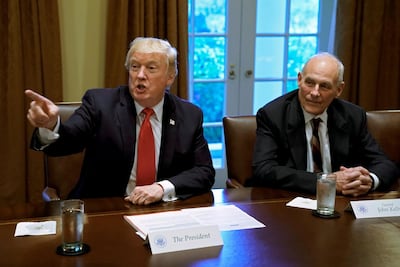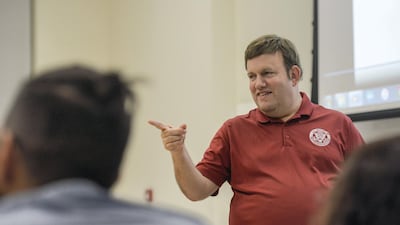In a classroom on Saadiyat Island, students from the UAE, China, America, Vietnam, India and elsewhere are talking, debating and learning. But this is no ordinary class and Frank Luntz is no ordinary teacher.
The renowned American pollster was in the capital this week to teach a class on the language of business over a whirlwind few days in Abu Dhabi.
On Thursday, The National joined Mr Luntz as he gave a masterclass in communications to a group of 12 enthusiastic NYUAD students from across the globe.
He shows video clips of American TV news coverage about Donald Trump, illustrating how polarised things have become.
Lines on the screen track the reaction of Conservative voters and when news anchors continually bash Mr Trump, the red lines dive and they switch off.
It shows they dislike the questions and therefore will reject the answers. It’s about how you ask the questions, he says.
“About 40 per cent of Americans no longer trust the media,” Mr Luntz told the students.
Frank Luntz is regarded as an American guru of political science, a master of the message and a firm proponent of the power of words, known in the US for his political focus groups.
And while he is a Republican, he hasn’t been immune to the Twitter rages of Trump. When one of his early focus groups reacted negatively to Trump’s candidacy, the tycoon publicly called him out on the social media site as a "total loser". Mr Luntz simply responded by thanking Mr Trump for the extra followers he'd gained from the episode.
Earlier, The National spoke to Mr Luntz one-on-one. And while he accepts even he didn't think Mr Trump would win at the start, that changed swiftly when he saw what was happening in his focus groups.
“Americans felt ignored, mistreated - even betrayed. And a very large segment, about half – wanted to be heard again. That’s what he offered.
“He insulted his opponents in a very graphic way and instead of audiences being offended – they cheered. And they rewarded behaviour that would have been unacceptable in any election up to then.”

Mr Luntz attributes Mr Trump’s victory in 2016 to everything from the economy to poor politics to the media. But the failure of reporters to notice Mr Trump’s rising appeal was significant, he said.
“The only reporters who caught on were the reporters who got off the planes, went to the car and drove an hour or further from the nearest international airport. Once you got an hour away from an international airport, you entered Trump country no matter where you were.
“Nobody went to those places. Nobody interviewed those voters apart from my focus groups. So no one knew.”
Another crucial factor was Mr Trump’s communication tool of choice: Twitter.
"More people learned what he had to say from his Twitter account than the New York Times. That's never happened. If Twitter did not exist, I'd question whether Trump would have won."
Turning to the broader political climate in America, Mr Luntz brands the atmosphere as that of bitterness and said one of the reasons he’s in Abu Dhabi is to get away from it all. He refers to NYUAD as a type of “United Nations that works”.
“The hate, the ugliness of American politics is like a third-degree sunburn and NYUAD is the balm.
“Here’s the coolest thing – which is the opposite of American politics – the [students] drop their assumptions within the first 48 hours of arriving.”
Last October NYUAD welcomed 361 into its class of 2021 – representing 88 nationalities and speaking about 71 languages. Looking around the classroom on the NYUAD campus on Saadiyat, it’s hard not to agree with Mr Luntz.

The students are engaged, intellectually curious and eager to learn. All praise the multiculturalism and enormous opportunities offered by studying in Abu Dhabi.
One of those at Mr Luntz’s class is Brian Greco, 21, from New York and studying globalisation.
“Having come from the States to a part of the world a lot of people ignore or don’t understand, what’s so remarkable to me about this university and country is that it’s literally the most respectful society I’ve ever spent time in. I think the school is an embodiment of that.”
Duc Le was another student attending Mr Luntz’s class and he comes from Vietnam.
“Frank has created a very helpful environment where we are encouraged to say what we think and to listen to the other side even if we don’t agree with it,” said the economics and finance student.
“The first thing I do is to have the student from Vietnam answer a question about China,” Mr Luntz interjects with a chuckle. “And then our Chinese student has an interesting response. That’s what I’ve tried to do through the whole class.”
Mohamed Amer is from Abu Dhabi and NYUAD offers him a chance to understand people of other backgrounds.
“Growing up in the UAE, I was always surrounded by people of different backgrounds and up until this point at NYUAD I did not have the chance to really engage or understand how the other side also feels,” said the social research and public policy student.
Earlier in the week, Mr Luntz had dinner with seven of the students at a restaurant in the city, organised by Tanya Bansal who is from India and studying economics.
“What people shared with me about the dinner was that it sort of made the students step outside their comfort zone because we talked about politics and whether the good times were behind or ahead of us,” she said.
“Everybody had a different take. But we thought good times are ahead but it depends on what we do and how we make them.”
Mr Luntz's last day at NYUAD was Thursday. When asked for his prediction about whether another Trump is on the cards, he replies he doesn’t know anymore.
“Contentious politics are here to stay. It’s very depressing. We no longer listen to each other. We no longer know how to talk to each other. We are dismissive and rude.
“Who knows what life will be like even a year from now. Not to mention three years.”


